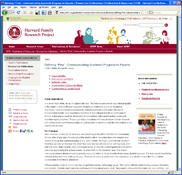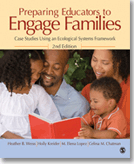The Harvard Family Research Project separated from the Harvard Graduate School of Education to become the Global Family Research Project as of January 1, 2017. It is no longer affiliated with Harvard University.

|
October 2010 Featured Teaching Case: Defining “Fine”—Communicating Academic Progress to ParentsHarvard Family Research Project
|
FINE: The Family Involvement Network of Educators
![]() The FINE Newsletter shares the newest and best family involvement research and resources from HFRP and other field leaders.
The FINE Newsletter shares the newest and best family involvement research and resources from HFRP and other field leaders.
FINE Newsletter, Volume II, Issue 3
Issue Topic: Using Student Data to Engage Families
Tips & Tools From Harvard Family Research Project
With a renewed emphasis on school improvement in today’s education climate, many schools and districts are investing in strategies to promote teacher effectiveness. One of these strategies is building teacher capacity to meaningfully reach out to and engage families in support of their children’s learning through the use of teaching cases.
Harvard Family Research Project’s Teaching Case series is designed to support teacher training and professional development in the area of family engagement. Each case highlights a particular challenge that schools, families, and communities may encounter in supporting children’s learning. Accompanying instructor’s notes encourage readers to think critically about major issues in the case.
In this month’s newsletter, we feature the teaching case Defining “Fine”—Communicating Academic Progress to Parents, which highlights one elementary school’s efforts to use and understand data about student progress toward state standards and to communicate these data clearly to parents. The case illustrates how families often struggle to understand the language of state standards, making it more difficult to monitor their children’s progress in school, and shows both the opportunities and challenges in working effectively with data for teachers, principals, and families.
About Defining “Fine”—Communicating Academic Progress to Parents
Molly is surprised when her son's teacher recommends he attend summer school. She thought he was doing just fine and the family had been doing a lot to make the home a rich reading environment. Meanwhile, Tammy Gray, who teaches Molly’s son, is concerned that the progress reports she sends to parents aren’t being fully understood. How can teachers better communicate academic progress with parents? How can administrators support teachers in this effort? Additional expert commentary explores how stakeholders in the case could improve their use of data and their communication about student progress.
Go to the Defining “Fine”—Communicating Academic Progress to Parents teaching case.
About Harvard Family Research Project's Teaching Cases
Harvard Family Research Project's Teaching Cases help prepare teachers and other professionals to partner effectively with the families of children in elementary school. These research-based case studies reflect critical dilemmas in family–school–community relations, especially among low-income and culturally diverse families. Each teaching case includes a narrative, discussion questions, recommended reading, instructor notes, and expert commentary.
This article is part of the Fall 2010 FINE Newsletter. The FINE Newsletter shares the newest and best family involvement research and resources from Harvard Family Research Project and other field leaders. To access the FINE Newsletter Archive, visit www.hfrp.org/FINENewsletter.

